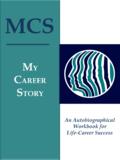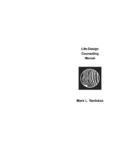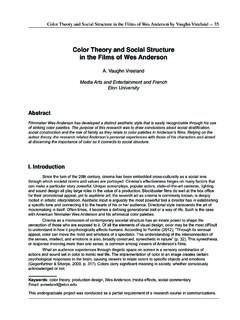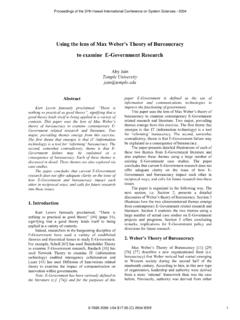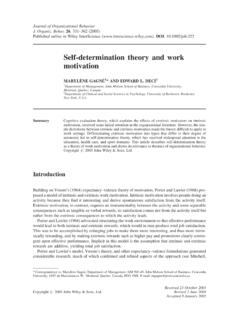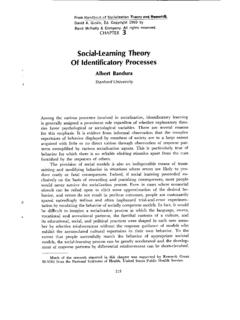Transcription of CAREER CONSTRUCTION THEORY - Vocopher
1 CAREER CONSTRUCTION THEORY CAREER CONSTRUCTION THEORY provides a way of thinking about how individuals choose and use work. The THEORY presents a model for comprehending vocational behavior across the life-cycle as well as methods and materials that CAREER counselors use to help clients make vocational choices and maintain successful and satisfying work lives. It seeks to be comprehensive in its purview by taking three perspectives on vocational behavior: the differential, developmental, and dynamic. From the perspective of individual differences psychology, it examines the content of vocational personality types and what different people prefer to do. From the perspective of developmental psychology, it examines the process of psychosocial adaptation and how individuals cope with vocational development tasks, occupational transitions, and work traumas.
2 From the perspective of narrative psychology, it examines the dynamics by which life themes impose meaning on vocational behavior and why individuals fit work into their lives in distinct ways. In coordination, the three perspectives enable counselors and researchers to survey how individuals construct their careers by using life themes to integrate the self-organization of personality and the self-extension of CAREER adaptability into a self-defining whole that animates work, directs occupational choice, and shapes vocational adjustment. RATIONALE CAREER CONSTRUCTION THEORY is one of many CAREER theories that seek to explain occupational choice and work adjustment, each interrogating a different aspect of vocational behavior. CAREER theories that have risen to prominence have done so because they effectively address important questions.
3 For example, the model of person-environment fit emerged early in the 20th century to address the question of how to match workers to work. The model of vocational development emerged in the middle of the 20th century to address the question of how to advance a CAREER in one organization or profession. These theories of vocational personality types and vocational development tasks remain useful today when considering how to match workers to work and develop a CAREER in an organization. However, the global economy of the 21st century poses new questions about CAREER , especially the question of how individuals can negotiate a lifetime of job changes without losing their sense of self and social identity. CAREER CONSTRUCTION THEORY responds to the needs of today s mobile workers who may feel fragmented and confused as they encounter a restructuring of occupations, transformation of the labor force, and multicultural imperatives.
4 This fundamental reshaping of the work world is making it increasingly difficult to comprehend careers with just person-environment and vocational development models that emphasize commitment and stability rather than flexibility and mobility. The new job market in our unsettled economy calls for viewing CAREER not as a lifetime commitment to one employer but as selling services and skills to a series of employers who need projects completed. In negotiating each new project, the prospective employee usually concentrates on salary yet also seeks to make the work meaningful, control the work environment, balance work-family responsibilities, and train for the next job. While the form of CAREER changes from stability to mobility to reflect the labor needs of post-industrial societies, CAREER CONSTRUCTION THEORY seeks to retain and renovate the best concepts and research from the 20th century CAREER models for use in the 21st century.
5 For example, instead of measuring personality traits as realist concepts and trying to prove construct validity, the THEORY concentrates on how individuals use what they have. In replacing scores with stories, CAREER CONSTRUCTION THEORY focuses on how individuals use their vocational personality to adapt to a sequence of job changes while remaining faithful to oneself and recognizable by others. The THEORY does this by focusing on the meaning that structures an individual s CAREER as it plays out across the ten or more different jobs that a worker today can expect to occupy during her or his work life. LIFE THEMES CAREER CONSTRUCTION THEORY , simply stated, holds that individuals build their careers by imposing meaning on vocational behavior. Personality types and developmental transitions deal with what a person has done and how they have done it.
6 However, they do not address the question of why they do what they do, nor do they focus on the spirit that animates nor the values that guide the manifold choices and adjustments that build a CAREER . Thus, CAREER CONSTRUCTION THEORY emphasizes the interpretive and interpersonal processes through which individuals impose meaning and direction on their vocational behavior. It uses social constructionism as a meta- THEORY with which to reconceptualize vocational personality types and vocational development tasks as processes that have possibilities, not realities that predict the future. From a constructionist viewpoint, CAREER , or more precisely subjective CAREER , denotes a moving perspective that imposes personal meaning on past memories, present experiences, and future aspirations by weaving them into a pattern that portrays a life theme.
7 Thus, the subjective CAREER that guides, regulates, and sustains vocational behavior emerges from an active process of making meaning, not discovering preexisting facts. The life theme component of CAREER CONSTRUCTION THEORY addresses the subject matter of work life and focuses on the why of vocational behavior. CAREER stories reveal the themes that individuals use to make meaningful choices and adjust to work roles. By dealing with the why of life themes along with the what of personality types and the how of CAREER adaptability, CAREER CONSTRUCTION seeks to be comprehensive in its purview. Although the content of personality and process of adaptation are both important, studying vocational personality and CAREER adaptability as separate variables misses the dynamics that integrate personality and adaptability into a self-defined whole.
8 The essential meaning of a CAREER , and the dynamics of its CONSTRUCTION , are revealed in self-defining stories about the vocational development tasks, occupational transitions, and work traumas that an individual has faced. In chronicling the recursive interplay between self and society, CAREER stories explain why individuals make the choices that they do and the private meaning that guides these choices. From these prototypical stories about work life, counselors attempt to comprehend the life themes that construct careers and understand the motives and meaning that pattern work life. The life theme component of CAREER CONSTRUCTION THEORY emerged from Donald E. Super's postulate that in expressing vocational preferences, individuals put into occupational terminology their ideas of the kind of people they are; that in entering an occupation, they seek to implement a concept of themselves; and that after stabilizing in an occupation, they seek to realize their potential and preserve self-esteem.
9 This core postulate leads to the conceptualization of occupational choice as implementing a self-concept, work as a manifestation of selfhood, and vocational development as a continuing process of improving the match between the self and situation. From this perspective on the self, work provides a context for human development and an important location in each individual s life, a place that matters. The life theme perspective highlights the view that careers are about mattering. Counseling for CAREER CONSTRUCTION aims to help clients understand how their life project matters to themselves and to other people. In CAREER CONSTRUCTION THEORY , the theme is what matters in the life story. It consists of what is at stake in that person s life. On the one hand, the theme matters to individuals in that it gives meaning and purpose to their work.
10 It makes them care about what they do. On the other hand, what they do and contribute to society matters to other people. The belief that what they do matters to others sharpens identity and promotes a sense of social meaning and relatedness. What individuals choose to do is the subject matter of vocational personality. VOCATIONAL PERSONALITY Vocational personality refers to an individual s CAREER -related abilities, needs, values, and interests. Individuals form personalities in their families of origin and develop these personalities in the neighborhood and school as they prepare to eventually enter the work world. Before these characteristics are expressed in occupations, they are rehearsed in activities such as household chores, games, hobbies, reading, and studying. CAREER CONSTRUCTION THEORY prefers to view interests and other CAREER -related traits as strategies for adapting rather than as realist categories.

